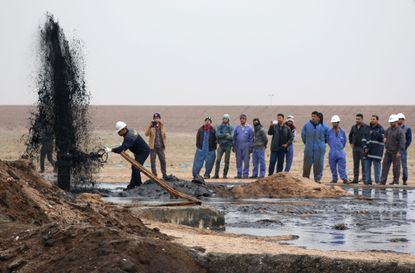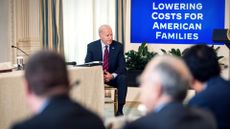Cheap oil could wreak havoc in Venezuela, Russia, and Iran — but the U.S. isn't immune


Global oil prices hit a new six-year low on Monday, with the international benchmark, Brent crude, settling at $42.69 a barrel, its lowest close since March 2009. A year ago, Brent crude was selling at about $103 a barrel. U.S. West Texas Intermediary crude closed at $38.24 a barrel, its lowest settlement since February 2009. The reason is China, which has driven the rise in global demand for oil but now appears headed for some sort of slowdown.
"New anxieties about frailties in China," says The New York Times, have raised fears that the price of oil "could remain depressed far longer than even the most pessimistic projections, and do even deeper damage to oil exporters." For consumers of gas and other petroleum products, that probably doesn't sound so bad. But the U.S. oil boom will take a hit, too, and weaker economies abroad will hurt U.S. exports.
For countries like Venezuela, Nigeria, Algeria, and Iraq that depend on oil revenue to finance their government, cheap oil is already causing domestic unrest and economic turmoil. Oil producers with significant reserves of foreign currency can fend off the pain for longer, says David Goldwyn, a former U.S. special envoy for energy affairs. "The countries which need to sustain investment to maintain political legitimacy need to be worried, and that's Brazil, Russia, and even Iran," he tells The New York Times.
Subscribe to The Week
Escape your echo chamber. Get the facts behind the news, plus analysis from multiple perspectives.

Sign up for The Week's Free Newsletters
From our morning news briefing to a weekly Good News Newsletter, get the best of The Week delivered directly to your inbox.
From our morning news briefing to a weekly Good News Newsletter, get the best of The Week delivered directly to your inbox.
Even Saudi Arabia — which started a race to flood global markets with cheap oil last November, in a bid to capture market share, The Wall Street Journal reports — is at risk of falling prey to its own strategy, assuming Chinese demand doesn't pick back up. With the growing Saudi population, “the expensive social contract between the royal family and Saudi citizens will get more difficult, and eventually impossible, to sustain if oil prices do not recover," says Meghan O'Sullivan at Harvard's Geopolitics of Energy program.
Jim Krane at Rice's Baker Institute notes that Saudi Arabia still has a $664 billion cushion, protecting its ruling family for a while. "In terms of oil busts, it's still early days," he tells The Wall Street Journal. But if the low prices continue, the U.S. and its geopolitical friends and foes alike will face varying degrees of discomfort, with unpredictable, not entirely positive consequences.
Create an account with the same email registered to your subscription to unlock access.
Sign up for Today's Best Articles in your inbox
A free daily email with the biggest news stories of the day – and the best features from TheWeek.com
Peter has worked as a news and culture writer and editor at The Week since the site's launch in 2008. He covers politics, world affairs, religion and cultural currents. His journalism career began as a copy editor at a financial newswire and has included editorial positions at The New York Times Magazine, Facts on File, and Oregon State University.
-
 'Stormy Monday for Don'
'Stormy Monday for Don'Today's Newspapers A roundup of the headlines from the US front pages
By The Week Staff Published
-
 6 queer poets to read whenever but especially now
6 queer poets to read whenever but especially nowThe Week Recommends April is National Poetry Month
By Scott Hocker, The Week US Published
-
 How women's pain is often ignored in health care
How women's pain is often ignored in health carethe explainer The gap in care is especially glaring compared to how men are treated
By Theara Coleman, The Week US Published
-
 Empty-nest boomers aren't selling their big homes
Empty-nest boomers aren't selling their big homesSpeed Read Most Americans 60 and older do not intend to move, according to a recent survey
By Peter Weber, The Week US Published
-
 Brazil accuses Musk of 'disinformation campaign'
Brazil accuses Musk of 'disinformation campaign'Speed Read A Brazilian Supreme Court judge has opened an inquiry into Elon Musk and X
By Rafi Schwartz, The Week US Published
-
 Disney board fends off Peltz infiltration bid
Disney board fends off Peltz infiltration bidSpeed Read Disney CEO Bob Iger has defeated activist investor Nelson Peltz in a contentious proxy battle
By Rafi Schwartz, The Week US Published
-
 Disney and DeSantis reach detente
Disney and DeSantis reach detenteSpeed Read The Florida governor and Disney settle a yearslong litigation over control of the tourism district
By Peter Weber, The Week US Published
-
 Visa and Mastercard agree to lower swipe fees
Visa and Mastercard agree to lower swipe feesSpeed Read The companies will cap the fees they charge businesses when customers use their credit cards
By Peter Weber, The Week US Published
-
 Reddit IPO values social media site at $6.4 billion
Reddit IPO values social media site at $6.4 billionSpeed Read The company makes its public debut on the New York Stock Exchange
By Peter Weber, The Week US Published
-
 Housing costs: the root of US economic malaise?
Housing costs: the root of US economic malaise?speed read Many voters are troubled by the housing affordability crisis
By Peter Weber, The Week US Published
-
 Feds cap credit card late fees at $8
Feds cap credit card late fees at $8speed read The Consumer Financial Protection Bureau finalized a rule to save households an estimated $10 billion a year
By Peter Weber, The Week US Published